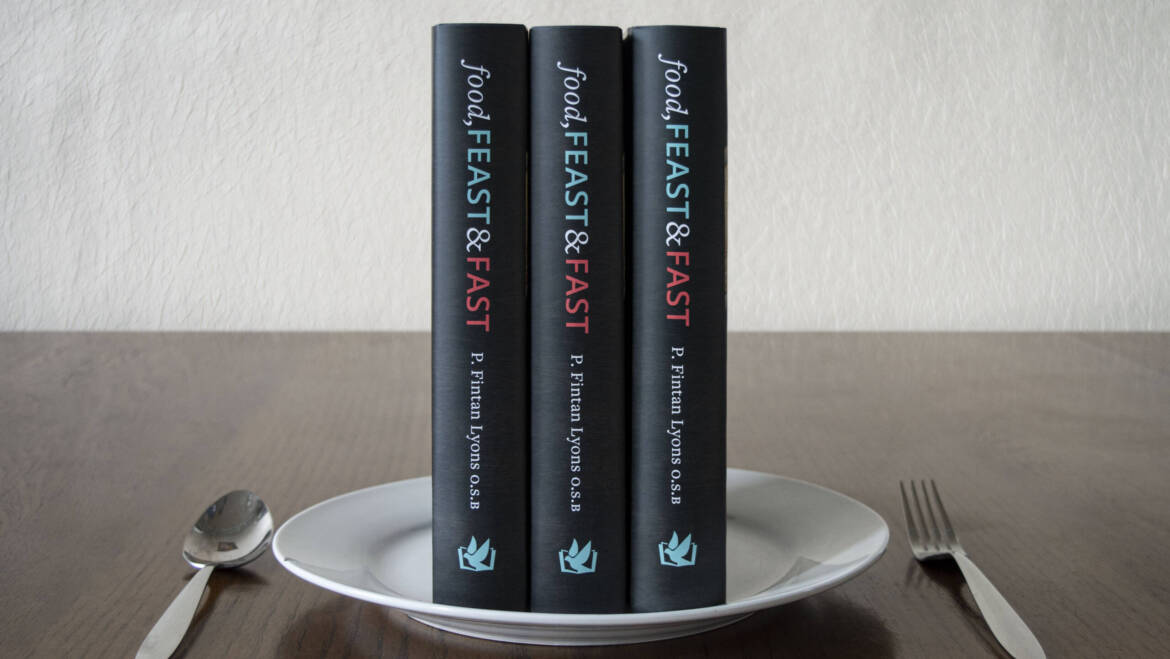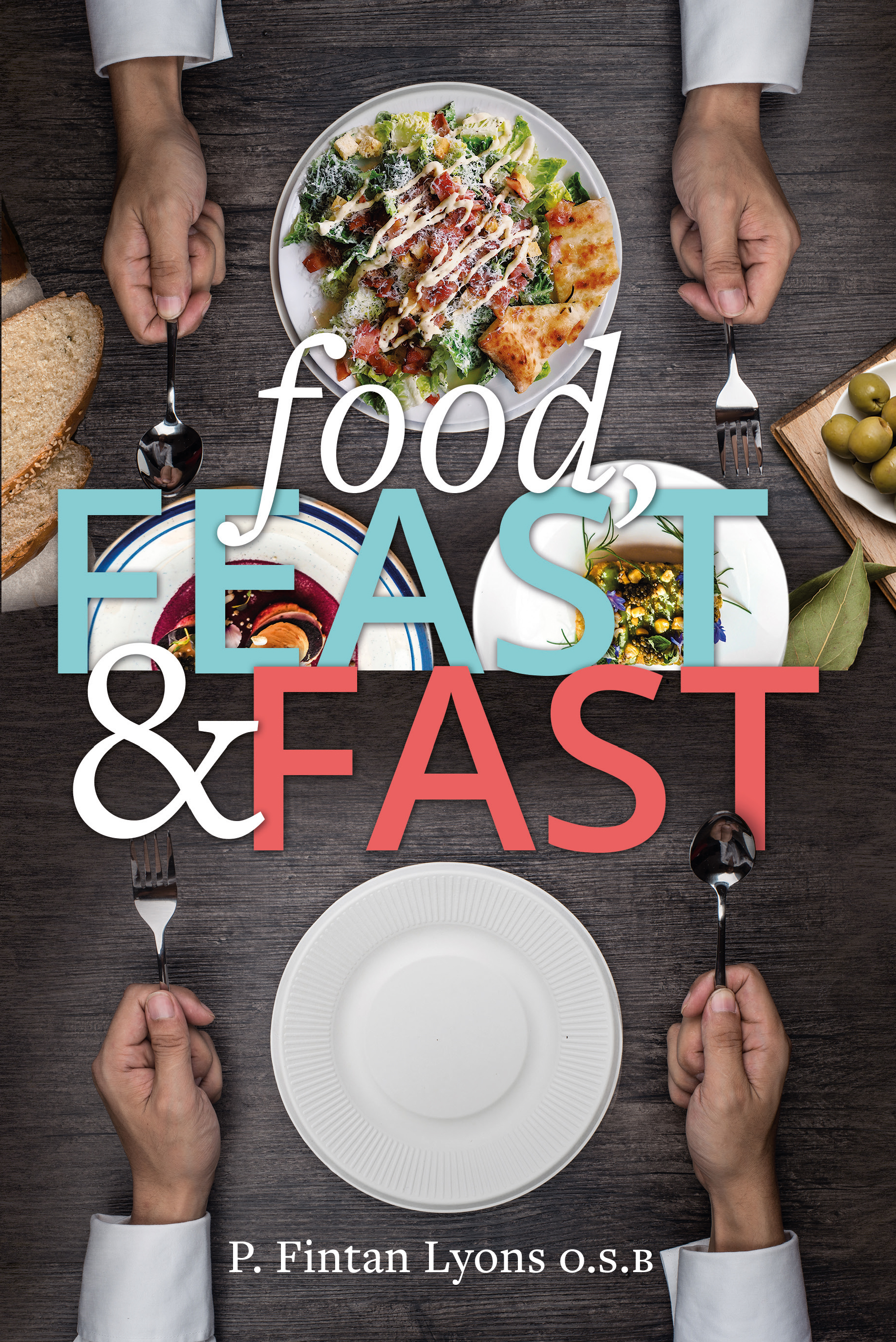Exclusive extract from Food, Feast & Fast by P. Fintan Lyons (Columba Books, 2019)
CHAPTER FIVE
The demands of Christian living.
From Augustine to Benedict
Whoever needs less should thank God and not be discontented;
but whoever needs more should feel humble because of his
weakness, not self- important because of the kindness shown him.
Those who embraced the ascetical life were inevitably a minority among Christians as in society generally and banqueting continued to be important in the Roman lifestyle, including banquets in memory of the dead, pagan and Christian. These appear to have led to abuses when celebrations got out of hand, as Saint Augustine (354-430) testified about the practice in North Africa, some two centuries after Pope Felix had called for masses to be said over the memorials of the martyrs. People now had freedom to celebrate as they wished. Augustine, not yet a bishop in 392, was quite scathing in his comments in a letter to the archbishop of Carthage, Aurelius:
(R)ioting and drunkenness are so tolerated and allowed by public
opinion, that even in services designed to honour the memory of
the blessed martyrs – not only on the annual festivals, but every
day – they are openly practised.
He was prepared to share communion in convivial meetings within the walls of private houses, in the disorder and even luxury of family life,
but at least let outrageous insult be kept far away from the tombs
of the sainted dead, from the scenes of sacramental privilege, and
from the houses of prayer. For who may venture to forbid in private life excesses which, when they are practised by crowds in holy
places, are called an honouring of the martyrs?
He suggested that Aurelius should encourage people to provide meals at the church for poor persons, instead of holding a ‘fiesta to the martyrs’ for their friends in the cemetery.
Augustine was concerned that Christians were turning the celebration of the memory of the martyrs – a celebration of the Eucharist, the context makes clear – into a bacchanalian carnival. A generation later, Pope Gregory (r590-604) wrote to Abbot Mellitus on his departure for Britain advising him about how he was to treat the people whose temples he was purifying for Christian worship (rather than destroying them). The people were accustomed to ‘sacrificing oxen to devils’, so now he could replace this practice by celebrating the festival of the martyrs, whose relics were enshrined in the temple, and have the people participate ‘with devout feasting’. ‘If the people are allowed some worldly pleasures in this way, they will more readily come to desire the joys of the Spirit.’ 3 This represented a change of policy on Gregory’s part as he had already written to King Ethelbert urging him to be
eager to spread the Christian faith among the people under your
rule; in all uprightness increase your zeal for their conversion; suppress
the worship of idols; overthrow the structures of the temples;
establish the manners of your subjects by much cleanness of life,
exhorting, terrifying, winning, correcting, and showing forth an
example of good works.
It would be a case of celebrating the Eucharist but whether the ‘people’ were by now Christians, or perhaps catechumens, is not clear. It would take the form which would be well established by the seventh century, but presumably the practice more familiar to the people of slaughtering and eating oxen – once it was made clear it was not a case of pagan sacrifice – could be absorbed into the celebration. The example illustrates how difficult it could be to change the habits of new converts, so that they
could appreciate and adapt to the simple Christian ritual.
Augustine on food and fasting
The candour Augustine showed throughout his Confessions caused him, not surprisingly, to comment on his need to control his participation in feasting in his own life. He recognised that food and drink were necessary to repair the ‘daily deterioration of the body’ and looked forward to the day when God will clothe corruptible nature with incorruptible life.
But for the present time the necessity is sweet to me, and I fight
against that sweetness lest I be taken captive by it. I wage daily war
upon it by fasting, bringing my body again and again into subjection;
but the pain this gives me is driven away by the pleasure (of eating and
drinking). For hunger and thirst really are painful; they burn and kill,
like fever, unless food comes as medicine for their healing. … This you
taught me, that I should learn to take my food as a kind of medicine.
Considering food as medicine rather than as nature’s way of maintaining life is highly significant in relation to the understanding of human life which Augustine had, as did other proponents of asceticism already mentioned. From his Neoplatonist understanding of the relationship between soul and body, he was less aware of food’s natural role of nourishing than of the therapeutic needs of the soul. Whether ‘greed was a far more acute and revealing source of disquiet for him than sexual temptation’, as one
historian observed, and therefore to be combatted rigorously by fasting, is of importance as far as his approach to the body is concerned. He did believe that sexual temptation could be repudiated once and for all, but the appetite for food had to be constantly kept in check; ‘the reins of the throat are to held somewhere between too tightly and too lightly’. Though drunkenness was not a problem for him, Augustine considered over-eating a temptation. In his Confessions, he felt the need to quote Lk
21:34: ‘Do not let your hearts grow dull with revelry and drunkenness’.
In his later years, as bishop, banquets could of course cause problems. His attempt to keep up his regime of fasting, or at least abstaining from meat, may have been involved when he adopted a novel approach to a situation that occurred at a banquet. While it was ostensibly an experiment on the antiseptic properties of peacock flesh, that may not have been the real explanation for his attitude to a slice of roasted peacock served to him:
It happened in Carthage that a bird of this kind was cooked and
served up to me, and, taking a suitable slice from its breast, I ordered
it to be kept, and when it had been kept as many days as
make any other flesh stinking, it was produced and set before me,
and emitted no offensive smell.
The experiment was repeated and after a year it was a ‘little more shrivelled and dried’!
His sermons on fasting
Given the importance of Augustine’s thought for the church in subsequent centuries, it is worth noting how he dealt with fasting in his sermons. There are seven Lenten Season sermons recorded along with a treatise, On the usefulness of fasting, which may also have been in fact a sermon. In this text, he makes a distinction between two kinds of food, earthly and heavenly. ‘On the former, the life of men depends; on the latter, the life of angels’.10 Faithful men are not to be compared with the infidels who consider that happiness is nothing else but the enjoyment of earthly pleasures, but neither are they like the inhabitants of heaven whose sole delight is the heavenly bread by whom they were created. Being in the middle, between being heavenly and being earthly, they are torn by conflicting desires. They are on the way, but not yet rejoicing.
Augustine could here have relied on our Lord’s saying that in his absence his disciples will fast, but he does not quote it and instead emphasises a Neoplatonist dualism; the flesh draws to the earth, the mind tends up wards. The flesh is below and God is above. A modern author, Veronika Grimm, a former professor of psychology, holds that:
In this view, in which the Platonic distinction is drawn to its extreme
conclusion, the human personality is split, the body is made
into an object or at best a slave, it becomes divorced from and
external to the person, who is to work upon it, shape it, restrain
it and mortify it, until it becomes like a piece of inanimate clay.
The author does at the same time acknowledge:
To be fair, Augustine was more charitable than many of the famous
athletes of asceticism, and did caution his monks against a
too severe mortification of their bodies by extreme fasting.
Augustine, in Chapter 5 of the treatise, adopts the pastoral and dynamic view that ‘fasting is for our journey’ and proposes to consider its nature, but gets caught up in criticism of pagans and Jews, who also sometimes fast but have not discovered the way on which Christians walk. In a series of sermons ‘For the Lenten Season’, Sermon 205 uses that pilgrim concept by exhorting the hearer not to sink into the mire of the earth by coming down from the cross. This should be the case especially during the forty days, which should also be days of fast and abstinence from conjugal relations. ‘What you deprive yourself of by fasting add to your almsgiving; … the body which engaged in carnal love prostrate in earnest prayer; the hands which were entwined in embraces extend in supplication.’ In a later sermon he repeats the call for special restraint to be practised even by married people.
Food, Feast & Fast
The Christian Era from Ancient World to Environmental Crisis
P. Fintan Lyons OSB
€19.99 €15.00
PRAISE FOR FOOD, FEAST & FAST
“In prose that is always clear, considered, and insightful, Lyons weaves together an impressive body of historical and theological literature to argue that ‘the role of food, feast and fast in the Christian life’ must now speak to what he calls ‘the looming environmental crisis’, with answers that are both spiritual and political.”
Dr. Richard J. Butler
School of History, Politics and International Relations
University of Leicester
“Many of us would not label our daily meal a feast. In fact, we probably take eating for granted unless we are food insecure or live in poverty. We fast out of necessity for health reasons, not religiously. Moreover, for many eating is something that is just done, with little thought and no fanfare. Unfortunately the same can probably be said for the way that many Christian believers approach the Holy Eucharist – we take it for granted and do not even think of it in terms of food or sustenance, much less a feast. Fintan Lyons, OSB challenges these attitudes towards food, feasting and fasting in this wide-ranging yet accessible introduction that is, in the end, a theology of eating.”
Professor Greg Peters
Professor of Medieval and Spiritual Theology
Biola University
“Lyons invites us to reflect upon the connectedness between what we profess and how we act in relation to our consumption of the fruits of the earth, the value we place upon shared meals as opportunities for deepening friendships and building community, and what can at times be an over-casual approach to celebrating the liturgy and especially the Eucharist. He is very much on the same page as Pope Francis in his demand of an integral ecology that is attentive to the plight of our planet and of the poor. It has been said that no one should be entrusted with a leadership role in the Christian community unless s/he can throw a good dinner party. This book explains why.”
Father Eamonn Conway,
Professor of Systematic Theology,
Mary Immaculate College, University of Limerick


